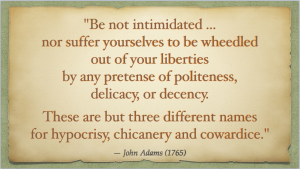My article, KBRA – The Trap is Set, caught (pun intended) some heat and lots of comments, too.
Please know that I chose my words carefully and I never accused anyone of being “a rat” but I did set up an illustration to point out that the federal government treats most of us like rats.
 Apparently, the big boys in their white, lab-coats like having us run in our cages. They want to control every aspect of our lives:
Apparently, the big boys in their white, lab-coats like having us run in our cages. They want to control every aspect of our lives:
- How much we eat and drink,
- What we eat and drink,
- How much energy we consume,
- What types of energy we consume
- How much grass our cows consume,
- How much water we use when we flush our toilets, etc., etc.
The elites in science have made puppets out of our legislators and are fast becoming the new ruling class.
Legendary Oxford scholar, Christian apologist and author C.S. Lewis warned, “The new oligarchy must increasingly rely on the advice of scientists until in the end the politicians become merely the scientists’ puppets.” Lewis’ warning realizes that science (a good thing) could be systematically perverted to attack religious traditions, subvert law and destroy human freedom. Lewis’ predictions are essential for us today because science is being used to extract money and power from the tax-paying public.
Consider science claims that once occupied the thrones of power and have since been debunked:
- The American public was told that coffee, eggs and bacon were killers. We were told to drastically reduce our consumption or our health would pay the price. Now, a few years later, the folks in the white lab-coats have new science that says, “Oops… coffee, eggs and bacon actually contribute to healthy diets.”
- In another example, paper grocery sacks were once common place, but plastic bag manufacturers developed a winning marketing strategy. They re-defined paper products as “non-renewable” because they come from our forest lands. Yet, everyone knows forest products are a naturally plentiful, renewable and bio-degradable. This was scare-mongering at its worse because the politically motivated marketing strategy actually prevailed over common-sense.
Legislators were caught, in a trap of their own making. They forgot their duty to the US Constitution – they wanted power, control and money.
The plastics industry consortium had set a perfect trap. They pushed an alternative backed by so-called science. It even looked reasonable, particularly after they sold the claim that worldwide destruction of forests would be imminent without immediate action.
Politicians saw their re-election campaign coffers filling with special interest money and they were trapped – like rats!
The same tactic is being used today against clean, affordable, renewable hydro-electric dam facilities. In Oregon, hydro-electric generation facilities constructed before 1995 have been deemed non-renewable by the legislature. This doesn’t make sense except that Oregon’s legislature has also been snagged by the false promises coming from the federal government.
The State of Oregon would be one of the nation’s top renewable energy producers if their hydro-electric definition followed common-sense. Unfortunately, as a top renewable producer, Oregon would no longer have access to fistfuls of money flowing from the federal largess.
In these cases, politics and science can be viewed as evil step-sisters. When left to their independent realms they can serve the public well, but when combined they are often misused.
Today, in the plastic bag arena, it’s happening in reverse. Estimates suggest over 1 trillion disposable plastic bags are used worldwide every year. Americans use and throw away 100 billion of these bags.
What solutions are being shoveled at the public? Government regulation, of course. Science again will be used to funnel your tax-dollars into the political winner’s circle.
This is not a solution, it is only regulation. It only serves those winners the government chooses, through legislative mandate. Remember, government has no power except coercive power – the power of forcing compliance through regulatory agencies.
Only free markets can accomplish solutions. Free markets do not need political aide to survive. This is why the KBRA/KHSA issue is so divisive. It promotes government regulation of water flows over common-sense solutions for solving water scarcity. Why not add water to our watershed? Why were water storage reservoirs omitted from this comprehensive 50 year agreement? Who’s in charge here? Who’s your master? (How many gallons of water can we use with each flush?)
Seeking political solutions to our societies problems of supply and demand would be like pouring clean, golden brown motor oil on your hot-cakes – it might serve as an appealing photo-op but it is a deadly combination.
Nearly 185 years ago, Alexis de Tocqueville noticed the potential for despotism in America. He observed men, “incessantly endeavoring to procure the petty and paltry pleasures with which they glut their lives.” Over these citizens would reign, “an immense and tutelary power, which takes upon itself alone to secure their gratifications.”
With dramatic insight, Tocqueville notes, “It would be like the authority of a parent if… its object was to prepare men for manhood; but it seeks… to keep them in perpetual childhood…”
Tocqueville realized the threat of lost liberty. He notes, it will happen when the government, “chooses to be the sole agent” of our happiness, security and pleasures.
His most poignant insight is the question, “What remains, but to spare them all the care of thinking and all the trouble of living?”
Tocqueville was a far better word smith than I and he avoided the “rat” analogy by using the more common language of his era which described a horse in harness: “Every man allows himself to be put in leading-strings, because he sees that it is not a person or a class of persons, but the people at large, who hold the end of his chain.”
In closing:
“Be not intimidated … nor suffer yourselves to be wheedled out of your liberties by any pretense of politeness, delicacy, or decency. These, as they are often used, are but three different names for hypocrisy, chicanery and cowardice.” – John Adams (1765)

